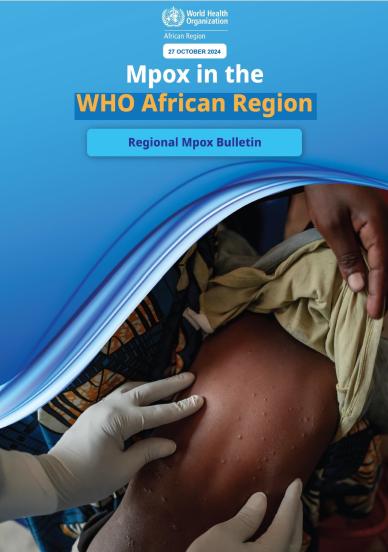
Regional Mpox Bulletin: 27 October 2024
Since 1 January 2022, cases of mpox have been reported to WHO from 20 Member States across the WHO African Region. As of 27 October 2024, a total of 11,852 laboratory confirmed cases, including 57 deaths, have been reported to WHO.
In 2024, as of 27 October 2024, 18 countries have documented 9,474 confirmed cases, including 35 deaths. The three countries with most of the cases in 2024 are Democratic Republic of Congo, (n = 7,534), Burundi, (n = 1,419), and Uganda, (n = 167). Fourteen (14) countries are assessed as active: DRC, Burundi, CAR, Congo, Ghana, Nigeria, Côte d’Ivoire, Liberia, Uganda, Kenya, Rwanda, Zambia, Zimbabwe, and Mauritius.
A significant number of suspected cases, that are clinically compatible with mpox are not tested due to limited diagnostic capacity and never get confirmed. For this reason, suspected cases are also shown in this section. Care should be taken when interpreting these cases, as they are collected according to different case definitions. In some countries, suspected cases that are negative after laboratory test are not removed from case counts.
Burundi: On 25 July 2024, the Ministry of Health in Burundi declared an outbreak of mpox driven by clade Ib of the virus following the confirmation of three cases by the National Reference Laboratory of the National Institute of Public Health. The situation escalated rapidly in the following weeks and the outbreak continues to evolve. The current mpox situation in Burundi shows significant activity, with a cumulative total of 3,026 suspected cases and 1,419 confirmed cases as of 27 October 2024. There have been no deaths reported among these cases, which is an encouraging sign for the country’s response efforts. The overall positivity rate stands at 42.6%, highlighting that a substantial proportion of tests return positive results for mpox across 42 out of the 49 districts (85.7%) that have reported a confirmed case. In the week ending 27 October 2024, a total of 222 confirmed cases were reported compared to 183 in epi week 41. A high positivity rate of 57% was reported. Contact tracing efforts have resulted in 7,368 contacts being listed and followed, with 512 of those traced in week 42 alone. The country has generated a total of 3,463 alerts in 2024, out of which 87.3% were investigated and sampled. However, challenges persist, such as insufficient fuel for field investigations, decentralization of surveillance activities, and low involvement of some health districts in community-based surveillance, which hampers the effectiveness of these efforts.
Gabon—in the control phase—reported its first confirmed case of mpox on 22 August in Libreville. The case involved a 30-year-old male who had recently travelled to Uganda, where he likely contracted the virus. Upon returning to Gabon, he developed symptoms, including fever, fatigue, and a generalized skin rash, and sought medical attention on 21 August. As of the last situation report on 6 October 2024, out of 15 suspected cases identified and tested, two tested positive for Mpox (the first case and a known contact of the first case). Gabon moved into the controlled phase on 1 September 2024 meaning that it had not reported any new cases in the past 42 days. However, the country is encouraged to strengthen and sustain active case surveillance and other community-based interventions to ensure that no community transmission is missed.
The Central African Republic: During the last 4 weeks, 32 suspected cases notified including 7 confirmed cases. From week 1-43 (ending 27 Oct), 387 suspected cases including 64 confirmed and 2 deaths (CFR: 3.1%) have been reported (one death was reported in epi week 41). Seven (7) patients are currently hospitalized in different health facilities as follows: Gamboula (1), Batangafo (1), Paoua (1) and Mbaïki (4). 82% of confirmed cases are below 25 years old, including 28% under 5 years old. Eight health districts are still active out of the 15 that have reported cases since the beginning of 2024. The circulating Mpox strain in CAR has been identified as Clade Ia. Country response efforts include A training of 90 health workers in 5 health districts (Sangha-Mbaére, Bambari, Nana-Gribizi, Kémo and Kouango-Grimari) on the management of Mpox cases (PCI, surveillance, and laboratory); Partner meeting held on 23 October 2024 aimed at positioning partners for financing the Mpox response plan which was attended by UNICEF, OXFAM, APSUD, WHO and NGOs.
Cameroon—in the control phase—as of 18 October 2024, the country has reported a total of 98 suspected mpox cases, of which 6 have been confirmed including two deaths, spread across 7 regions. The last confirmed case was reported on 7 September 2024. Clade II has been identified as the circulating strain in the country. Laboratory capacity for mpox testing remains limited, and there are challenges in community engagement and risk communication. Cameroon moved into the control phase on 1 September 2024 meaning that it had not reported any new confirmed cases in the past 42 days.


